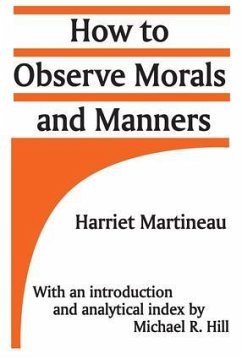How to Observe Morals and Manners is the first systematic and substantive treatise on the methodology of sociological research. First published in 1838 and long out of print, this new edition presents for modern students research techniques used by those whose work has been the foundation for present-day social science. The book is based upon two years of intensive field research in the United States, and is a pioneering benchmark for all subsequent methodology texts in sociology. Martineau charts a comprehensive guide to sociological observation, exploring problems of bias, hasty generalization, samples, reactivity, interviews, participant observation, corroboration, and data recording techniques. Couching her observations as advice to travellers visiting foreign lands, she warns against preconceptions and urges strict reporting of observed patterns of cross-sections of social life. She also illustrates how to use interview data to corroborate observational data. Pragmatic tips and specific questions are suggested for exploring the major institutions of society, including religion, education, marriage, popular culture, markets, prisons, police, media, government, fine arts, and charities. Intended as a treatise on methodology, the book is also an insightful work of theory. Before Marx, and well before Durkheim and Weber, Martineau examined social class, forms of religion, types of suicide, national character, domestic relations and the status of women, delinquency and criminology, and the intricate interrelationships between social institutions and the individual. The book will be of interest to sociologists, geographers, anthropologists, historians, and researchers in women's studies. The introduction by Michael R. Hill locates the book within Martineau's overall epistemology of social analysis, revealing her to be a reflexive, critical, and scientific pioneer of sociological thought.
Bitte wählen Sie Ihr Anliegen aus.
Rechnungen
Retourenschein anfordern
Bestellstatus
Storno









